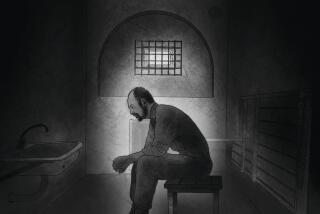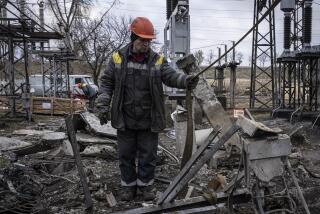Russia Risks Blackouts as Unpaid Miners Halt Work
- Share via
PARTIZANSK, Russia — Five months after they last got paid, the miners of the Russian Far East are beginning to starve. By Friday, all 10,000 of them had stopped work--not, they say, out of ill will but simply because they are just too weak to handle the tough conditions underground.
No coal is being extracted. The region’s power plant workers, themselves unpaid for months, also are refusing to operate the stations that supply electricity to the factories, homes and port of the local capital, Vladivostok. More than 300 of the power plant employees are on a hunger strike.
This all has led to growing fear that a crippling electrical blackout soon may grip Russia’s vast Pacific coastal area.
It could harm this nation’s already struggling economy by staggering trade in the mercantile Far East, whose port and economic links with Japan, South Korea and China make it the jewel in the crown of Russian regions.
But in a sign of the endemic corruption in the government at all levels and the continuing woes in distant Russian regions caused by the post-Soviet collapse, the best that people here see with regard to the simple solution to their crisis--getting the pay they say they deserve--is promises, promises but no concrete results.
“You could say we were on a hunger strike also, or you could just say we were people driven to desperation by not being paid,” said Vasily P. Petrichenko, union boss at Tsentralnaya mine here. “We have reached the point where we are worried about our very survival.”
A balding man with a worried air, Petrichenko is ashamed to walk around his battered workplace, where he sees the dereliction caused by repeated delays in the payment of wages and the funds needed to keep the mine going. There is no way to ask for help; Tsentralnaya does not even have a phone to call Vladivostok.
Skinny children playing near the clanking pit grin bashfully and shake their blond braids when asked what they ate for breakfast. “Nothing,” 6-year-old Masha replies eventually. Her favorite food? “Bread.”
Ragged adults loiter in the heat and coal dust, waiting for a daily handout of subsistence rations. They must sign for even these meager handouts so their cost can be deducted at some later date from their pay. The food costs more here than in town, but they have no cash to sidestep the system and buy it in ordinary shops.
Listless demands for “live money”--hard cash--are on everyone’s lips here. They are eager to show their tightened belts and the safety pins holding up clothes that are now falling off them.
*
A grayish block of frozen fish a yard square has been slammed down on the dirty concrete floor of the canteen, where workers are hacking tails and scales off the catch for the dejected wives waiting in line outside. Later, there will be black bread, though not enough to go around.
This is all that the 1,000 miners of Tsentralnaya can expect to eat today. Cans of sardines also sent from Vladivostok are being kept back in the storeroom; their sell-by date of June 1995 has scared distributors.
“It makes no difference whether you work or not. You still don’t get paid, you still don’t eat,” said Eduard A. Rzhevsky, 50, a repairman emerging black-faced and drenched with sweat from the elevator shaft. He sighs, baring a mouth of gaps and steel teeth.
Seven time zones away, Moscow has begun to panic at the idea of darkness engulfing a part of the nation that is so economically productive.
But a flurry of promises of partial payment and high-level visits in the past two days has done nothing, so far, to solve the problem. The miners have heard too many empty promises. They resolved on Wednesday to hang on till the bitter end: until the debt to them was paid in full, or until they starved to death.
A Friday pledge by First Deputy Prime Minister Vladimir V. Kadannikov that $18 million was on its way for the miners, out of a debt of $22 million, and an additional $7.7 million for the electricity workers, who are owed $23 million, was unlikely to shake that resolve.
Nor was the promise of Yevgeny I. Nazdratenko, governor of the region, to pay power workers $1 million from local funds. Fuel and Energy Minister Yuri K. Shafranik, due in Vladivostok today, may have more promises.
The regional mining enterprise Primorskugol blames Moscow for the crisis. General Director Anatoly M. Vasyanovich said Moscow had repeatedly failed to pay the region for coal it took, making it impossible to pay the miners. His solution--which Moscow is certain to hate--has been to look outside Russia for independent buyers of Primorskugol’s coal stocks. He has already found one Japanese buyer and delivered $400,000 worth of coal.
*
Nazdratenko, though, looks more set to take the rap for the crisis. The governor spent weeks in Moscow in July, trying to meet influential Kremlin figures and get Russian President Boris N. Yeltsin to earmark more money for his region.
But a power shift at the top of Russian politics, after presidential elections July 3, has removed Nazdratenko’s conservative allies in the Kremlin from Yeltsin’s entourage, replacing them with liberals.
Anatoly B. Chubais, new liberal head of Yeltsin’s administration, is no friend of Nazdratenko, and the governor has come home empty-handed.
The liberal newspaper Izvestia ran a four-part series last week accusing Nazdratenko of corruption. As an elected leader, Nazdratenko cannot be sacked--but he could be removed from his job to face criminal proceedings.
On Friday, the official Itar-Tass news agency said Yeltsin had ordered a 10-day inquiry into the crisis and wanted it to “lead to the punishment of the guilty.” Tass quoted an “informed Kremlin source” as saying $12 million was sent from the federal budget to Vladivostok in January to pay energy sector wages--but that Nazdratenko’s men had only paid out a third. “Where the balance is now remains unknown,” it added ominously.
The miners do not know whom to blame. All they know is that they are right at the bottom of a food chain stretching up to the Kremlin in Moscow, and that predators along the way have been taking bites out of the money owed them.
“We keep saying it’s all Yeltsin’s fault. We’re always blaming Moscow,” said Anatoly I. Novikov, a miner who had gone hungry for 10 days. “But now I’d also like to know what Nazdratenko has been doing with my pay.”
More to Read
Sign up for Essential California
The most important California stories and recommendations in your inbox every morning.
You may occasionally receive promotional content from the Los Angeles Times.










